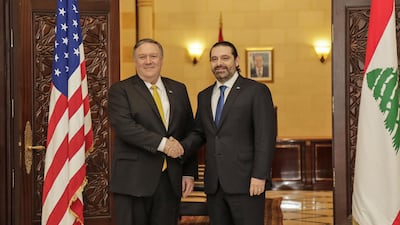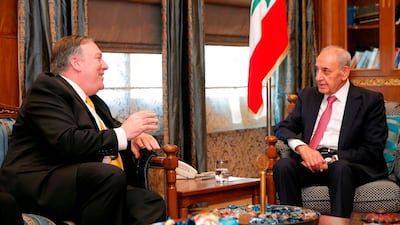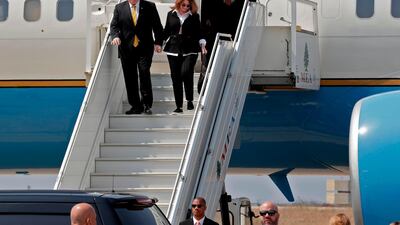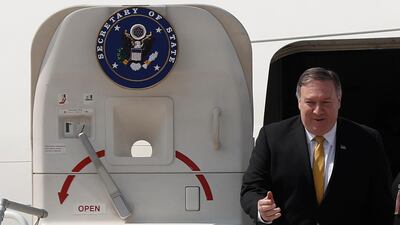Mike Pompeo arrived in Lebanon on Friday amid strong regional condemnation of US Presdent Donald Trump's declaration that it is time the United States recognised Israel's sovereignty over the occupied Golan Heights.
The abrupt pronouncement was likely to cloud the US Secretary of State's two-day visit, during which he is to meet top Lebanese officials, including many who are aligned with militant Hezbollah group, which is aligned with Syria and Iran.
The visit is the last leg of a Middle East tour that took Mr Pompeo to Kuwait and Israel, where he lauded warm ties and met Israeli Prime Minister Benjamin Netanyahu on at least three separate occasions, promising to step up pressure on Iran.
On Thursday, Mr Trump tweeted that Golan Heights is of "critical strategic and security importance" to Israel and therefor the US should recognise their sovereignty over the contested territory, which is in Syria but controlled by Israel.
It marks a dramatic shift in US policy over the status of Golan Heights, which was captured by Israel in the 1960s and annexed in the 1980s in a move not recognised by the international community.
On Friday, Syria vowed to recover the area using "all available means" and their allies Russia and Iran also criticised Mr Trump for his comment.
On arriving in Lebanon, Mr Pompeo had a brief meeting with Raya Al Hassan, the Arab world's first female interior minister.
The US State Department's deputy spokesman, Robert Palladino, said the two discussed the regional and internal security challenges facing Lebanon and how the US can help support efforts to maintain stability.
Mr Pompeo also met Lebanon's Parliament Speaker Nabih Berri, before heading for a working lunch with Prime Minister Saad Hariri.
Mr Berri told Mr Pompeo that US sanctions on Hezbollah were having a "negative impact on Lebanon and the Lebanese". He said they are a political party represented in the government and parliament, and that the armed "resistance" against Israel was a result of the continuing Israeli occupation of Lebanese territory.
Mr Trump signed into law the Hezbollah International Financing Prevention Amendments Act in October last year, putting into effect a new set of sanctions that targets the Lebanese militant group and its financial support network.
The White House said the move would "further isolate Hezbollah from the international financial system and reduce its funding” and “target foreign persons and government agencies that knowingly assist or support” the group.
Mr Pompeo hopes to step up pressure on Hezbollah during his visit to Lebanon, who wield power in parliament and the government, but could face resistance even from the US's regional allies. They fear that pushing too hard could spark a backlash and endanger fragile peace.
Mr Pompeo will also meet President Michel Aoun on Friday.
"We'll spend a lot of time talking with the Lebanese government about how we can help them disconnect from the threat that Iran and Hezbollah present," Mr Pompeo said earlier this week.
"Hezbollah is a terrorist organisation. You ask how tough I am going to be? It is a terrorist organisation. Period. Full stop," Mr Pompeo said.
Mr Pompeo was likely to announce new Iran-related sanctions from Beirut on Friday, which are expected to include Iranian nuclear scientists and technicians, according to US and Israeli officials briefed on the plans.






